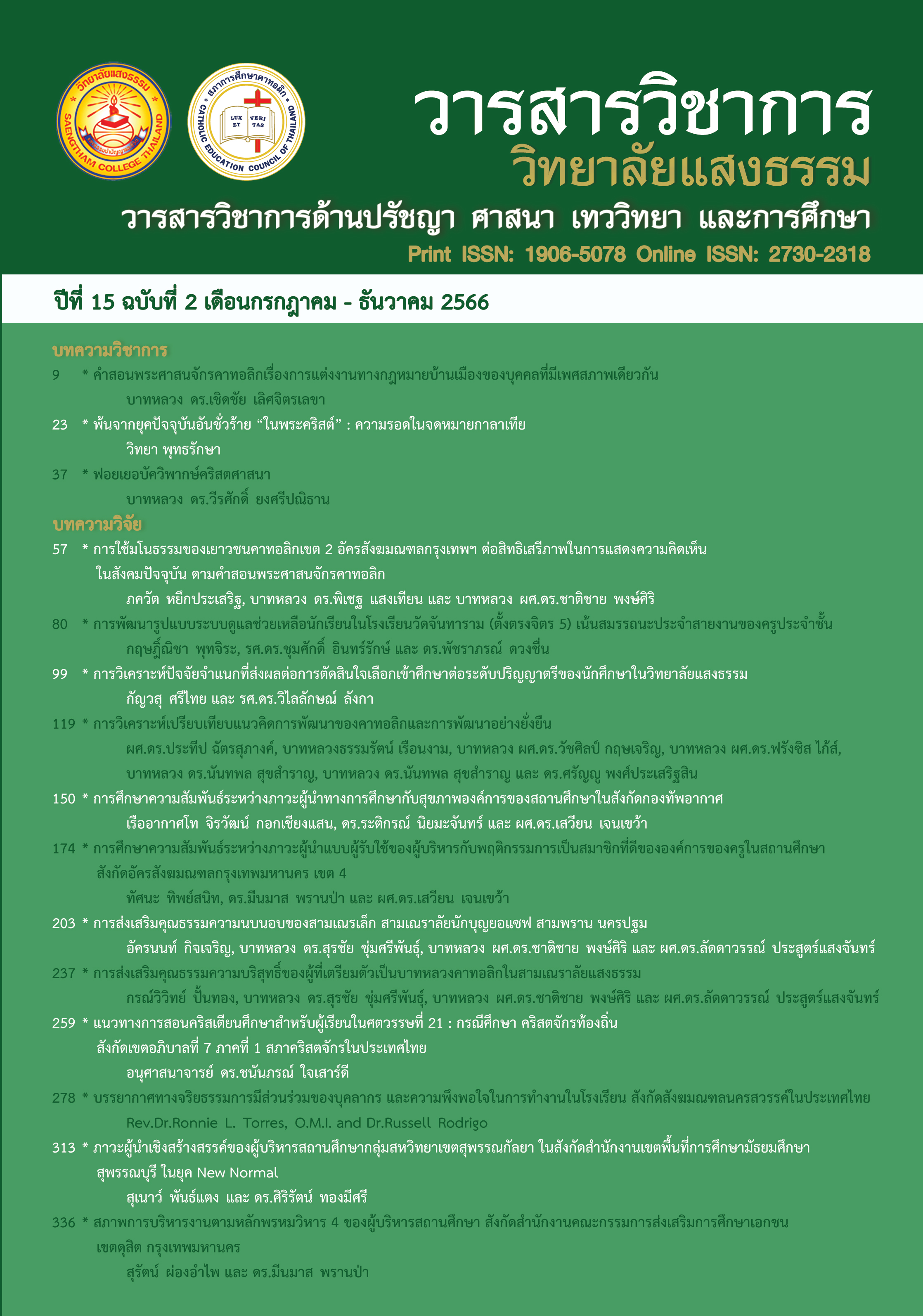A Discriminant Analysis of Factors Decision to Study The Undergraduate Program in Saengtham College.
Main Article Content
Abstract
The purposes of this research are as follows: 1) to compare the factors affecting students' decision to choose to pursue further study, and 2) to study discrete
factors affecting students' decision to choose to pursue
further study. The samples consisted of 182 undergraduate students studying in the academic year 2022, selected by purposive sampling.
The instrument used for data collection was 1 copy of a questionnaire on discriminant factors affecting students' decision to study at the undergraduate level of Saengtham College, a 5-level estimation scale consisting of 55 items which were divided into personal factors, marketing mix, and psychological factors. The discriminant power (r) ranged from 0.22 - 0.94 and the reliability was 0.96. The data were analyzed using a ready-made processing program to find percentage, mean, standard deviation, and discriminant analysis.
The study found that:
A comparison of the differences in factors among students who made a decision to choose to study differently found that the factors of family income, product, price, place, promotion, people, process, physical evidence, future expectations in religious work, motivation for religious work and attitudes towards religious leaders were different as a statistically significant a level of .01 which indicated that the factors used in this study affected students' decision to choose to continue their studies. This is in line with the results of the discriminant factor analysis that affects the student's decision to choose to study further. There were 11 factors that were recruited into the discriminant equation, arranged in descending order of the standard coefficients, regardless of the sign, namely physical evidence, future expectations of religious work, product, family income, place, motivation for religious work, process, attitudes towards religious leaders, promotion, price, and people. The classification equation was able to predict the membership of different groups of students who decided to study in different groups correctly at 70.80 percent, with the classification equation. (Discriminant Function) as follows
Y = .727(Physical) - .525(Expectation) + .510(Product)
+ .408(family income) + .369(Place) + .343(Motivation)
- .335(Process) - .148(Attitude) + .077(Promotion)
- .076(Price) + .056(People)
Article Details

This work is licensed under a Creative Commons Attribution-NonCommercial-NoDerivatives 4.0 International License.
- The academic and research articles, as well as the content and opinions expressed therein, published in Saengtham College Journal are solely the responsibility of the respective author(s).
- Articles published in Saengtham College Journal are the property of Saengtham College. Reproduction, modification, or dissemination of all or part of the content in any form without written permission from Saengtham College is prohibited.
- Articles published in Saengtham College Journal are protected under the Copyright Act.
References
จิตรลดา ชวนชัยสิทธิ์. (2559). ปัจจัยที่มีผลต่อการตัดสินใจเลือกศึกษาในระดับอุดมศึกษาที่คณะสถาปัตยกรรมศาสตร์และการผังเมือง มหาวิทยาลัยธรรมศาสตร์ ของนักศึกษา ระดับปริญญาตรี ชั้นปีที่ 1. [วิทยานิพนธ์ปริญญามหาบัณฑิต]. มหาวิทยาลัยธรรมศาสตร์.
ชุตินันท์ เจียมจิระเศรษฐ์. (2561). การตัดสินใจศึกษาต่อระดับปริญญาตรี สถาบันเทคโนโลยีไทย-ญี่ปุ่น. [วิทยานิพนธ์ปริญญามหาบัณฑิต]. มหาวิทยาลัยศรีนครินทรวิโรฒ.
ทิพวรรณ ปิ่นทองพันธ์ และคณะ. (2561). ปัจจัยที่ส่งผลต่อการตัดสินใจเลือกเข้าศึกษาระดับปริญญาตรี คณะวิทยาการจัดการ มหาวิทยาลัยสงขลานครินทร์ : กรณีศึกษา ผู้มีสิทธิ์สอบสัมภาษณ์ประจำปีการศึกษา 2561. (กองทุนวิจัย). มหาวิทยาลัยสงขลานครินทร์.
น้ำทิพย์ เนียมหอม. (2560). ปัจจัยส่วนประสมการตลาดที่มีผลต่อการตัดสินใจเลือกศึกษาต่ออาชีวศึกษาในวิทยาลัยเทคโนโลยีวิบูลย์บริหารธุรกิจ รามอินทรา. [วิทยานิพนธ์ปริญญามหาบัณฑิต]. มหาวิทยาลัยเกริก.
ผ่องใส สินธุสกุล และคณะ. (29 - 30, มีนาคม, 2561). ปัจจัยที่ส่งผลต่อการตัดสินใจเลือกเข้าศึกษาระดับปริญญาตรีคณะวิทยาการจัดการของนักศึกษามหาวิทยาลัยราชภัฏนครปฐม. ใน ดร.สุชาดา แสงดวงดี (ประธาน), น้อมนำศาสตร์พระราชา สู่การวิจัยและการพัฒนาท้องถิ่น อย่างยั่งยืน [Symposium]. การประชุมวิชาการระดับชาติ ครั้งที่ 10 มหาวิทยาลัยราชภัฏนครปฐม, มหาวิทยาลัยราชภัฏนครปฐม.
รัชตานันท์ อนงค์เวท. (2561). ปัจจัยส่วนบุคคลทีมีผลต่อการตัดสินใจเลือกเรียนที่มหาวิทยาลัยเทคโนโลยีสุรนารีของนักศึกษาโควตา ชั้นปีที่ 1 ปีการศึกษา 2555. (กองทุนวิจัย). มหาวิทยาลัยเทคโนโลยีสุรนารี.
วิจัยและนวัตกรรม, ส. ว. (2562). แผนด้านการอุดมศึกษาเพื่อผลิตและพัฒนากำลังคนของประเทศ พ.ศ. 2564-2570. https://drive.google.com/drive/folders/12UzeAe3hDVrQkhhHB_ NMAjeJwMdta3v
สุจจินตนา ศรีรัตนกุล และคณะ. (2560). ปัจจัยที่มีอิทธิพลต่อการตัดสินใจเลือกศึกษาต่อในระดับอุดมศึกษาที่มหาวิทยาลัยรามคำแหง ประจำปีการศึกษา 2560. วิจัยสำนักมหาวิทยาลัยรามคำแหง.
สุวิมล ติรกานันท์. (2553). การวิเคราะห์ตัวแปรพหุในงานวิจัยทางสังคมศาสตร์. โรงพิมพ์แห่งจุฬาลงกรณ์มหาวิทยาลัย.
สำนักนโยบายและแผนการอุดมศึกษา. (2561). แผนอุดมศึกษาระยะยาว 20 ปี (พ.ศ. 2561 – 2580). https://qa.chandra.ac.th/files/pdf/Law/hedu_plan20yrs.pdf
เสรี สิงห์โงน และคณะ. (2561). ปัจจัยที่มีผลต่อการตัดสินใจเลือกเข้าศึกษาต่อหลักสูตรวิทยาศาสตรมหาบัณฑิต สาขาวิชาจิตวิทยาเด็ก วัยรุ่นและครอบครัวมหาวิทยาลัยมหิดล. วารสาร Mahidol R2R e-Journal, 5(3), 92-107.
Becton Loveless. (n.d.). Factors to Consider When Choosing a College or University. Education Corner – Education That Matters. https://www.educationcorner.com/factors-choosing-a-college.html
Booms, B.H. and Bitner, M.J. (1981). Marketing Strategies and Organizational Structures for Service Firms. in James H. Donnelly and William R. George (eds.), Marketing of Services, Chicago: American Marketing Association pp.47–51. (nn.pp.) https://www.scirp.org/%28S%28351jmbntvnsjt1aadkposzje%29%29/reference/referencespapers.aspx?referenceid=2530717
Mark Murphy. (2018, 29 Jul). What Motivates You At Work?. Forbes. https://www.forbes.com/sites/markmurphy/2018/07/29/what-motivates-you-at-work/?sh=39ea5d535c1f
Mooij, M. D. (2004). Consumer Behavior and Culture: Consequences for Global Marketing and Advertising. Sage publications.
Pew Research center. (2019, 15 November). AMERICANS HAVE POSITIVE VIEWS ABOUT RELIGION’S ROLE IN SOCIETY. https://www.pewresearch.org/religion/2019/11/15/most-congre gants-trust-clergy-to-give-advice-about-religious-issues-fewer-trust-clergy-on-personal-matters/
Richard M.S. Wilson, Colin Gilligan. (2004). Strategic Marketing Management. Routledge.


